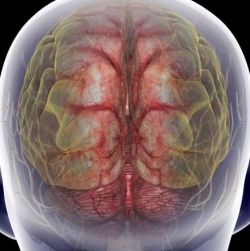
Major depression or chronic stress can cause the brain to shrink and lead to emotional and cognitive impairment, a team of researchers have concluded.
The group, led by Yale University scientists, says the activation of a single genetic switch that triggers loss of brain connections in humans and depression in animal models is key to their discovery.
The team’s findings, published in the Aug. 12 issue of Nature Medicine, show that the switch known as a transcription factor represses the expression of several genes that are necessary for the formation of synaptic connections between brain cells.
"We wanted to test the idea that stress causes a loss of brain synapses in humans," Prof. Ronald Duman, the study’s senior author, said in a statement. "We show that circuits normally involved in emotion, as well as cognition, are disrupted when this single transcription factor is activated."
The research team analyzed tissue of depressed and non-depressed patients donated from a brain bank and looked for different patterns of gene activation.
The brains of patients who had been depressed exhibited lower levels of expression in genes that are required for the function and structure of brain synapses.
Duman theorizes that genetic variations in the switch may one day help identify people at high risk for major depression or sensitivity to stress.
"We hope that by enhancing synaptic connections, either with novel medications or behavioural therapy, we can develop more effective anti-depressant therapies," Duman said.
